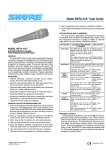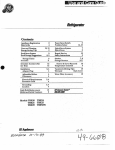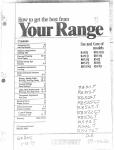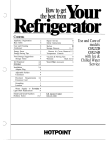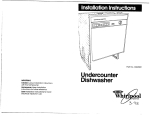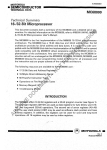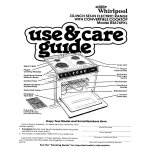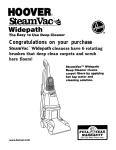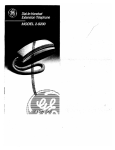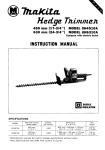Download GE AED18 Air Conditioner User Manual
Transcript
Ak ContiYioner
Contents
Air Direction
Air F-ilter
4
5
Installation Instructions
7-11
Model and Serial Numbers 2,5
Appliance Registration
(;arc and (;leanin~
2
5
Problem Solver
Repair Service
{;ondenser (:oils
(;ontrol Settings
5
3,4
Electrical Requirements
Elnergy Saver Switch
7
3
F:nergy-Saving Tips
F;xtension (;ords
2
7
(lrille and (;abinet
(;rounding
5
Models
AES15 AED18
AES18 AES23
GEApp#ances
7
6
6
Safety Instructions
2
User Maintenance Instructions 5
Warranty
GEAnswer Centera
800.626.2000
Back (lover
Help us
help you...
hportant Safety
Instructions
Before usi~ your air
conditioner, read this book
carefully.
Read M Mructions before
usi~ this apptiance.
It is intended to help you operate
and maintain your new air
conditioner properly.
Keep it handy for answers to your
questions.
If you don’t understand something
or need more help, write (include
your phone number):
Consumer Affairs
GE Appliances
Appliance Park
Louisville, KY 40225
Write down the model
and serial numbers.
You’ll find them on a label behind
the air discharge louvers. They’ll
be easier to read if you shine a
flashlight on them or remove the
front grille. (See page 5.)
These numbers are also on the
Consumer Product Ownership
Registration Card that came with
your air conditioner. Before sending
in this card, please write these
numbers here:
When using this appliance, always
exercise basic safety precautions,
including the following:
● Use this appliance only for ik
intended purpose as describd in
this Use and Care Guide.
● This air conditioner must be
properly instilled in accordance
with the Insbllation Instructions
before it is used. See grounding
instructions on page 7.
● Never unplug your air conditioner
by pulling on the power cord.
Always grip plug firdy and pull
straight out from the receptacle.
● Repair or replace immediately
all electric service cords that
have become frayed or otherwise
damaged. Do not use a cord that
shows cracks or abrasion damage
along its length or at either the
plug or connector end.
SAW TWE
INSTRUCTIONS
Model Number
Serial Number
Use these numbers in any
correspondence or service calls
concerning your air conditioner.
If you received a dam~ed
air conditioner . . .
Immediately contact the dealer
(or builder) that sold you the air
conditioner.
Save time and money.
Before you request
service . . .
Check the Problem Solver on
page 6. It lists causes of minor
operating problems that you can
correct yourself.
2
Ene~y-savi~ tips
. Keep the air filter clean. (See
instructions on page 5.)
● For most efficient cooling, keep
the vent control in the CLOSED
position except when you want to
exhaust air, smoke or odors from
the room.
c Don’t let the room get too
hot. Whenever possible, turn the
unit on before the room heats up.
When heat is “stored up” in walls,
furniture, rugs and draperies, your
air conditioner takes longer to
produce the desired comfort
condition.
● Keep windows and doors
closed. Cool, dry air escapes
when they’re open.
● Keep furnace floor registers and
cold air returns closed. Cold air
can easily escape through them.
● Don’t let drapes or furniture block
the front of the unit and restrict air
flow when it is operating.
● It’s best to operate your air
conditioner at high speed during
extremely hot weather.
● Keep the outdoor condenser coil
clean. (See page 5.)
● Turn the air conditioner off
before vacations or extended
absences from home.
Opemting Your Air Conditioner Controk
OFF
cOOLER
/,
1
FAN
~-
2
9
10
OPEN — D CLOSEO
VENTIMTION
COOL
SELECTOR
THERMOSTAT
Selector Switih
Thermostat Control
Ventilation Control
OFF turns air conditioner off.
*LOW FAN permits low fan speed
When you turn the Thermostat
Control to the desired setting, the
thermostat will automatically control
The vent door in your air
conditioner is closed when the
slide switch is to the right. When
the vent is closed, onl~the air
inside the room can be circulated
and conditioned. Sliding the knob
to the left opens the vent door,
allowing a small amount of indoor
air to be exhausted from the room.
Setting the Ventilation Control at
OPEN lets room air be exhausted
to the outside. This is helpful in
removing stale air, smoke or odors
from the-room, and perrnim outdoor
air to enter through normal openings
in the house. However, cooling
effectiveness is reduced when this
control is set at OPEN, so we su~est
you don’t keep it there long—
especially in hot, humid weather.
operation without cooling.
*MED FAN permits medium fan
speed operation without cooling.
*HIGH FAN permits high fan
speed operation without cooling.
*For FAN operation, Energy Saver
Swtch mus~ be in NOMk-position,
LOW COOL permits cooling with
low fan speed operation.
MED COOL permits cooling with
medium fan speed operation.
HIGH COOL permits cooling
with high fan speed operation.
the temperature of the indoor air.
The higher the number selected,
the cooler the indoor air will be.
*Ene~y Saver Swikh
(on models so equipped)
SAVE
NORMAL m
ENERGY SAVER
(continued next page)
L
The Energy Saver Switch controls
the fan operation. When it’s in
the NOR-MAL position, the fan will
circulate room air continuously.
When it’s in the SAVE position, the
fan will automatically cycle on and
off with the compressor.
3
Opemting Your Air Conditioner
Controb(continued)
For normal cooling
For quieter operation
To adjust air direction
1. Set the Selector Switch at HIGH
COOL.
1. Set the Selector Switch at LOW
COOL position.
Up and down
2. Set the Thermostat Control at
the desired number (usually 5-7 is a
good starting position). If room
temperature is not satisfactory after
a reasonable time, set the Thermostat
Control at a higher number for a
cooler room or at a lower number
for a warmer room.
2. Turn the Thermostat Control to
the desired number.
When the Thermostat Control is
set on 9 or 10 and the Fan is set on
low speed, moisture may freeze on
the coils and prevent the unit from
cooling. If this happens, set the Fan
at high speed and set the Thermostat
Control to a lower number.
3. Set the Energy Saver Switch* at
NORMAL position for continuous
fan operation or at SAVE position
to automatically cycle the fan on
and off with the compressor.
4. Set the Ventilation Control at
CLOSED except for brief periods
when you want to exhaust room air
to the outside.
For maximum cooling
1. Set the Selector Switch at HIGH
COOL.
2. Turn the Thermostat Control to 10.
3. Set the Ventilation Control at
CLOSED.
4. Set the Energy Saver Switch* at
the NORMAL position.
3. Set the Ventilation Control at
CLOSED.
4. Set the Energy Saver Switch* at
the NORMAL position.
Note: When the Energy Saver
Switch* is at the SAVE position,
changes in the sound level may be
more noticeable than when it’s at
the NORMAL position.
UP-AND-DOWN—
AIR DIRECTION
Y
Three separate banks of up-anddown air direction louvers are
controlled by fingertip pressure on
the louvers. They regulate air
discharge upward, downward or
straight out.
Side to side
OFF
For nighttime operation
During the cooler evening hours,
we recommend that you set the
Selector Switch at LOW COOL
for very quiet operation and the
Thermostat Control at mid-range
(5 or 6). Set the Ventilation Control
at CLOSED and the Energy Saver
Switch* at NORMAL or SAVE
position.
For extreme temperatures
For greatest economy and best
performance, we suggest you set
the Selector Switch at HIGH
COOL in extremely hot weather.
ON
m
CIRCUWIRE
Some models have a Circulaire
Switch. For fixed side-to-side air
direction, slide the Circulaire
Switch to ON until the desired air
direction is obbined, then move it
to OFF.
For continuous side-to-side air
circulation, set the Circulaire
Switch to ON and leave it there.
Other models have two separate
banks of side-to-side air direction
louvers with separate tabs to let you
direct discharged air to the right, to
the left, or straight ahead.
*On models so equipped
4
Care and Cleaning
USER MAINTENANCE
INSTRUCTIONS
Afier cleaning, replace the grille.
Use a magnetic-tipped screwdriver
to attach the grille with the two
screws removed in step 2.
Turn air conditioner off and
remove plug from wall outlet
before cleaning.
Grille & Cabinet
Wipe front grille with a clean cloth
lightly dampened with mild liquid
dishwashing detergent. Wash cabinet
with mild soap or detergent and
lukewarm water.
Condemer Coils
These coils on the weather side
of the unit should be checked
periodically and cleaned if clogged
with dirt or soot from the atmosphere.
If extremely soiled, they may need
to be steam cleaned, a service available
through your GE service outlet.
Air Filter
The air filter behind the inlet grille
should be washed at least every 30
days or as often as it needs cleaning.
Note: If the air conditioner is
installed high through a wall, you
can pull the lower part of the inlet
baffle toward you and pull the filter
down and out.
Vacuum the filter on the dusty side
to remove light dust. Wash the filter.
cleaner side up, under gently flowing
water to wash out accumulated dust
and lint. If the filter is very dirty,
use a mild household detergent in
the wash water. Let the filter dry
thoroughly before replacing it.
Front Grille Removal
The front grille can be removed for
more thorough cleaning or to make
the model and serial numbers
easier to read.
To remove the grille:
To remove the filter, grasp the
upper part of the inlet baffle and
pull toward you. Then pull the filter
up and out.
1. Grasp the upper part of the
inlet baffle and pull it away from
the frame. Do the same to the lower
part of the inlet baffle. Then pull
the baffle straight out and off the
frame.
2. Remove and save the two slotted
hex washerhead screws that hold
the grille to the frame.
5
To replace the inlet baffle, align
the large tabs on the baffle with the
slots on the frame and push straight
on until the baffle snaps into place.
PROBLEM
POSSIBLE CAUSE AND REMEDY
AIR CONDITIONER
DOES N~ OPERATE
●
AIR CONDITIONER
“DOES NOT COOL
AS IT SHOULD”
Not plugged in. Plug may have been bumped loose by vacuum cleaner or furniture.
. If plugged in, fuse could have blown or circuit breaker may have tripped.
. Curtains, blinds or furniture blocking front of air conditioner will restrict airflow.
● Thermostat Control may not be set high enough. Turn control to a higher number.
Highest setting should provide maximum cooling. When Energy Saver Switch (on some
models) is set at SAVE, temperature range in room will vary more.
●
Air filter dirty, should be cleaned at least every 30 days. See instructions on page 5.
● Room may have been very hot when air conditioner was first turned on. Allow time for
it to cool down.
●
Cold air maybe escaping through open furnace floor registers and cold air returns.
● Ventilation control maybe set at open position, allowing hot outside air to enter
the room.
● Cooling coils have iced up. To melt ice, set the Selector Switch to HIGH FAN and the
Thermostat Control to a lower number.
OPERATING
SOUNDS
● Thermostat click, a metallic sound, maybe heard when compressor cycles on and off.
This is normal.
● Fan runs continuously when Selector Switch is in Cool or Fan position. This is normal.
When Energy Saver Switch (on some models) is set at SAVE, fan cycles on and off with
compressor.
Excess water may overflow in extremely hot and humid weather. This is normal.
WATER DRIPPING
OUTSIDE
●
WATER DRIPPING
INSIDE
● Air conditioner must be installed with the specified tilt to the outside for proper water
disposal.
WATER IN BASE PAN
(ON OUTDOOR SIDE)
● This is normal for a short period in areas with little humidity; normal for a longer
period in very humid areas. Moisture removed from indoor air drains to rear of cabinet
where it is picked up by a fan ring and thrown against the outdoor condenser coil.
If Vou need more help.. call, toll free:
oGE
Answer
Center
800.6262000
consumer information service
If You Need Service
To obtain service, see your warranty
on the back page of this book.
We’re proud of our service and
want you to be pleased. If for some
reason you are not happy with the
service you receive, here are three
steps to follow for further help.
FIRST, contact the people who
serviced your appliance. Explain
why you are not pleased. In most
cases, this will solve the problem.
NEXT, if you are still not pleased,
write all the details-including
vour Dhone number—to:
Manager, Consumer Relations
GE Appliances
Appliance Park
Louisville, Kentucky 40225
,’
6
FINALLY, if your problem is still
not resolved, write:
Major Appliance
Consumer Action Panel
20 North Wacker Drive
Chicago, Illinois 60606
Imtallation Imtructiom
~PORTANT: ~ave these instructions with the appliance.
OWNER: Wep these instructions for future use.
Electrical Safetv—
IMPORTANT... “
Please Read Carefully.
How to connect electricity
For personal safety, this
appliance must be properly
grounded.
Electrical requirement
230/208-volt models require their
own single branch circuit supplying
230/208-volt a.c., protected with a
time delay fuse or circuit breaker.
This is recommended for best
performance and to prevent
overloading house wiring circuits,
which could cause a possible fire
hazard from overheating wires.
The Dower cord on these models
has ~ 230/208-volt perpendicular,
tandem or large tandem type plug
that mates resDectivelv with a
230/208-volt ~erpend~cular,
tandem or large tandem type wall
outlet. These types of outlets are
available at most hardware stores.
Q@
MATCHING
230/208-VOLT
PERPENDICULAR TYPE WALL OUTLET
LINE CORO PLUG
REQUIRES 20 AMP TIME DELAY FUSE
OR CIRCUIT BREAKER PROTEUION
@@
MATCHING
230/208-VOLT
WALL OUTLET
TANDEM TYPE
LINE CORD PLUG
REQUIRES 15 AMP TIME DELAY FUSE
OR CIRCUIT BREAKER PROTECTION
.(@’ 0 mm
@o
●
MATCHING
230/208-VOLT
LARGE TANOEM TYPE WALL OUTLET
LINE CORO PLUG
REQUIRES 30 AMP TIME DELAY FUSE
OR CIRCUIT BREAKER PROTE~lON
7
It is important to have the wall
outlet and circuit checked by a
qualified electrician if there is
any doubt as to whether a proper
ground exis@.
Use of etinsion cords
not recommended
Because of potential safety
hazards under certain conditions,
we stron~y recommend against the
use of an extension cord. However,
if you stifl elect to use an extension
cord, it is absolutely necessary that
it be a UL listed 3-wire grounding
type appliance extension cord and
that the current carrying rating of
the cord in amperes be equal to or
greater than the branch circuit size
shown on the rating nameplate of
the appliance.
Imtallation Imtructiom
(continued)
Window Sash Seal
Safety Lock and
Type B Screw
/
w
‘opr’
Washer Head
Locking Screw
‘oar:et
Frame
ssembly
(right)
Frame
ksemb
(left)
Window
Filler /
Side R:tainer
Panel
Seal—Bottom Rail to Unit
~Type
1.
\
C
Screws
and Locknuts
@
J
-“”e
yj;;:;/
Bracket
0
r~
,
:
si,,An:::;&p
\
o
‘,
1
@
Q
m
‘b
;?,
For window installation
● Large blade-type screwdriver
● Adjustable wrench or pliers
. Rule or tape measure
● Pencil
● Sharp kife or razor blade
;?
,~,
m
~’
Qty-4
Qty-2
Qty-3
Hand saw . Hammer
● Level
● Chisel
● Caulting gun
● Concrete saw (if installing
through a masonry wall)
●
T~F
Qty-2
Qty-10
Note: All supporting park should
be secured to firm wood,
masonry or metal.
*
Window Requirement@
Standard double-hung window
with actual opening width of
32” to 38”.
● Clear, vertical opening of 201/2”
minimum from bottom of sash to
stool.
8
~’
I
t
201/2”
min.
●
For thru-the-wall installation
● All the tools above (except bife
or razor blade) plus
● Magnetic stud finder (optional)
● Tin snips (optional)
T?
Type D Bolt
Qty-2
Took Needed
Tf
I
32” to 38”
.
Window Mounting
Window Requirement
2. Instill Top Angle
and Side Retainers.
(continued)
A 112” clearance below the window
stool is required.
If the storm window frame does not
allow this clearance, attach a 1 Y2 ~
or 2~wide strip of wood along the
entire length of the window opening,
flush with the back side of the stool,
or remove the storm window for
the air conditioning season.
1. Attach foam gasket ‘
to top angle as shown. ‘-~ . . . .
x.
4
o
~,
E
,!
1 12”
,
201/2”
11 Iizff
min.
~
-!min”k
; ‘! ./
I
‘1
‘~’
2. Install top rail and side retainers
to cabinet as shown, using 10 Type
F screws.
Window
Panel
Filler
,,, 1
m’
T
\
stool
Storm Window Frame
or Other Obstruction
I
P
1. Remove the Chassis.
Top View
r
Slide chassis from cabinet by
holding with left hand while-pulling
on handle at bottom front of unit.
Be careful of sharp edges on the coil
fins.
If your unit has corrugated packing
material inside the cabinet, it must
be removed. Do not remove the
foam pads inside the cabinet.
Note: Handle is N~ intended
for lifting the unit. It is only for
sliding the chassis out of the
cabinet for cleaning or maintenance.
3. Assemble Window
Hller Wneh.
1. Place cabinet on floor, bench or
..........
Air:,,y:g,n~~,, >:1:%:
table.
2. Slide the “I” section of the
window filler panel into the panel
retainer on the side of the cabinet
as shown above. Do both sides,
3. Insert top and bottom legs of the
window filler panel frame into the
channel in the top support angle
and bottom rail. Do both sides.
9
“l”
1/’ ~ ‘<
,’
Locking
~;,.~:] ~
~
Screw
/
Hole
Section ‘---- ‘“
Window
Filler
Panel
Y\)
4. Insert two Type A screws into
holes in the top leg of the filler
panel frame. Do not tighten—legs
should slide easily.
Window Mounting
(continued)
4. bcate Cabinet
in Window.
7. Install Window hck
and Sash Seal.
1. Open window and mark center
of window stool.
2. Place cabinet in window with
bottom stool angle firmly seated
over window stool as shown. Bring
window down temporarily behind
top rail to hold cabinet in place.
I
stool I
+*$
Stool Angle
2. Assemble sill angle brackets
to support brackets at positions
previously marked, as-shown. Hand
tighten only—some adjustment may
be required later.
2. Attach right angle safety lock
with Type B screw as shown.
1
I
LJ
1. Trim sash seal to fit window
width and insert into space between
upper and lower sashe;.
3. Shift cabinet left or right as
needed to line up center of cabinet
on center line marked on stool.
3
3. Position bottom rail seal on
bottom rail flush with front edge of
rail and in conmct with side seals.
& Sfide~assis into Cabinet.
3. Install support brackets, with sill
angle brackets attached, to cabinet
as shown.
Type B S;rews
4. Tighten all 6 bolts securely.
4. Fasten cabinet to window stool
with 2 Type B screws. (You may
want to drill pilot holes. )
5. Install Support Bracke&.
lpecscrewsandLocknuts
~. reaulred
for each suDDort
bracket)
.
,,
fk
---
~
:%
6. Etiend Window Hller
Panek.
1. Carefully raise window to
expose filler panel locking screws.
Loosen screws so panels slide easily.
Be sure handle at bottom of unit is
up. Then lifi chassis and carefully
slide it into cabinet. Do not push on
controls or finned coils. Make sure
chassis is firmly seated toward rear
of cabinet.
9. Instill Dial Plate,
Button and Knobs.
—
RIGHT
%
[ Type D Bolt”
I
o
‘o p
QQ
o
00/
w ‘
LEFT
0
0
Sill Angle Bracket”
*(1 required for each support bracket)
1. Hold each support bracket flush
against outside of sill and tight to
bottom of cabinet as shown. Mark
brackets at top level of sill and
remove them.
If dial plate has a protective film,
peel the film off carefully. Do not
scratch the surface of the plate.
—
2. Extend panels to fill window
opening completely and tighten
locking screws on top.
3. Close window behind top rail.
10. Attach Pront Grille.
(a) Remove inlet baffle (see page 5).
(b) Attach front grille to unit (see
page 11, step 6b).
(c) ReinsMl irdet baffle (see page 5).
10
Through-the-Wall Imbllation
c The cabinet may be installed
through the wall in both existing
buildings and new construction.
2. Prepare the Cabinet.
s The side louvers must project
on the outdoor side of the wall.
2. With caulking compound or
electrical tape, seal 10 holes
provided in cabinet for top rail
and side retainers not used in this
installation.
● The room side of the cabinet must
project into the room at least 1“
from the finished wall.
. The cabinet must be installed
level from side to side and with a
3/8” tilt from front to rear.
1. Remove chassis from cabinet.
3. Install Cabinet in Wall.
1. Place cabinet in wall opening.
— Holes for
= #10 1,, Long
c Wood Screws
0
——
——
:{
Took Required
See page 8.
Additional Materials
(obtain locally)
.2 wood screws, 1“ long
● 10 #10 wood screws, 1“ long
● 1 tube high grade caulking
compound
● Lintel, if required, to support
bricks or blocks above op~ning.
Cabinet.
2!. Secure bottom rail to wood
frame with two 1“ long wood
.,crews obtained locall].
1. PreDare Wall ODeninp.
.
.
Q
1. Determine size of opening.
Measure width and height of c~binet
and add 1/8” to each dimension.
3. Secure cabinet to wooden frame
with ten #10 1“ long screws or nails
obtained locally. If frame is oversize,
use shims to eliminate distortion.
Be sure handle at bottom of unit is
up. Then lift chassis and carefully
slide it into cabinet. Do not push on
controls or finned coils. Make sure
chassis is firmly seated toward rear
of cabinet.
5. Instill Dial Plate,
Button and Knobs.
See page 10, step 9.
6. Attach front Grille.
—
(a) Remove inlet baffle from front
grille (see page 5).
t
18-5/8”
,;8,,
+
—
2. Choose the wall opening
location. Be sure wall receptacle
is (or will be) installed nearby.
3. Make the opening. Frame it
to support the weight of the air
conditioner. Add metal flashing
over bottom of frame opening and
1“ UP on sides to reduce the
possibility of condensate entering
the area between the inner and
outer wall.
I
-w
4. Caulk all four sides on the
outdoor side of cabinet to ~revent
moisture from getting thr;ugh to
the interior wall. Use of flashing (a
piece of aluminum or galvanized
steel available at most hardware
stores) will further prevent moisture
from getting into interior walls.
a screw in this
location, remove and discard screw
before installing front grille.
5. Install wood trim molding
(obtained locally) around roomside
projection of cabinet, if desired.
(b) Attach front grille to unit with
two Type E hex washerhead screws
as shown above.
E Screw
(c) ReinsMl inlet baffle (see page 5).
11
I
YOUR GENERAL ELECTRIC ROOM AIR CONDITIONER
WARRANTY
Save proof of original purchase date such as your sales slip or cancelled check to establish warranty period,
WHAT IS COVERED
FULL ONE-YEAR WARRANTY
For one year from date of original
purchase, we will provide, free
of charge, pafls and service labor
in your home to repair or replace
any part of the room air
conditioner that fails because
of a manufacturing defect.
FULL FIVE-YEAR WARRANTY
For five years from the date of
original purchase, we will provide,
free of charge, parts and service
labor in your home to repair or
replace any part of the sealed
mfrigemting system (the compresso~
condenser, evaporator and all
connecting tubing) that fails
because of a manufacturing
defect.
%r each of the above warranties:
Transportation expense to and
from a service shop and shop
service labor if required will be
free of charge.
This warrantv is extended to
the original purchaser and any
succeeding owner for products
purchased for use in the 48 mainland
states, Hawaii and Washington, D.C.
In Alaska the warranty is the same
except that it is LIMITED because you
must pay to ship the product to the
service shop or for the service
technician’s travel costs to your home.
All warranty service will be provided
by our Factory Service Centers or
by our authorized Customer Care”
servicers during normal working
hours.
Look in the White or Yellow Pages
of your telephone directory for
GENERAL ELECTRIC COMPANY,
GENERAL ELECTRIC FACTORY
SERVICE, GENERAL ELECTRICHOTPOINT FACTORY SERVICE or
GENERAL ELECTRIC CUSTOMER
CARE@ SERVICE.
WHAT IS N~ COVERED
● Service trips to teach you how to
use the product.
Read your Use and Care material.
If you then have any questions
about operating the product,
please contact your dealer or our
Consumer Affairs office at the
address below, or call, toll free:
GE Answer Cente@
800.626.2000
consumer information service
Improper installation.
If you have an installation
problem, or if the air conditioner
is of improper cooling capacity
for the intended use, contact
your dealer or installer. You are
responsible for providing adequate
electrical connecting facilities.
●
Replacement of fuses or
resetting of circuit breakers.
●
● In commercial locations labor
necessary to move the unit to a
location where it is accessible for
service by an individual technician.
. Failure of the product resulting from
modifications to the product or due to
unreasonable use including failure to
provide reasonable and necessary
maintenance.
● Failure due to corrosion on models
not corrosion-protected.
. Damage to the product caused
by improper power supply voltage,
accident, fire, floods or acts of God.
WARRANTOR IS NOT RESPONSIBLE
FOR CONSEQUENTIAL DAMAGES.
Some states do not allow the exclusion or limitation of incidental or consequential damages, so the above limitation or exclusion
may not apply to you. This warranty gives you specific legal rights, and you may also have other rights which vary from state to state.
To know what your legal rights are in your state, consult your local or state consumer affairs office or your state’s Attorney General.
Warrantor: General Electric Company
If further help is needed concerning this warranty, write:
Manager—Consumer Affairs, GE Appliances, Louisville, KY 40225
I
Pan No. 90GER-D02 I
Pub. No. 49-7220
10-89
.
AES15
AES18
AES23
AED18












